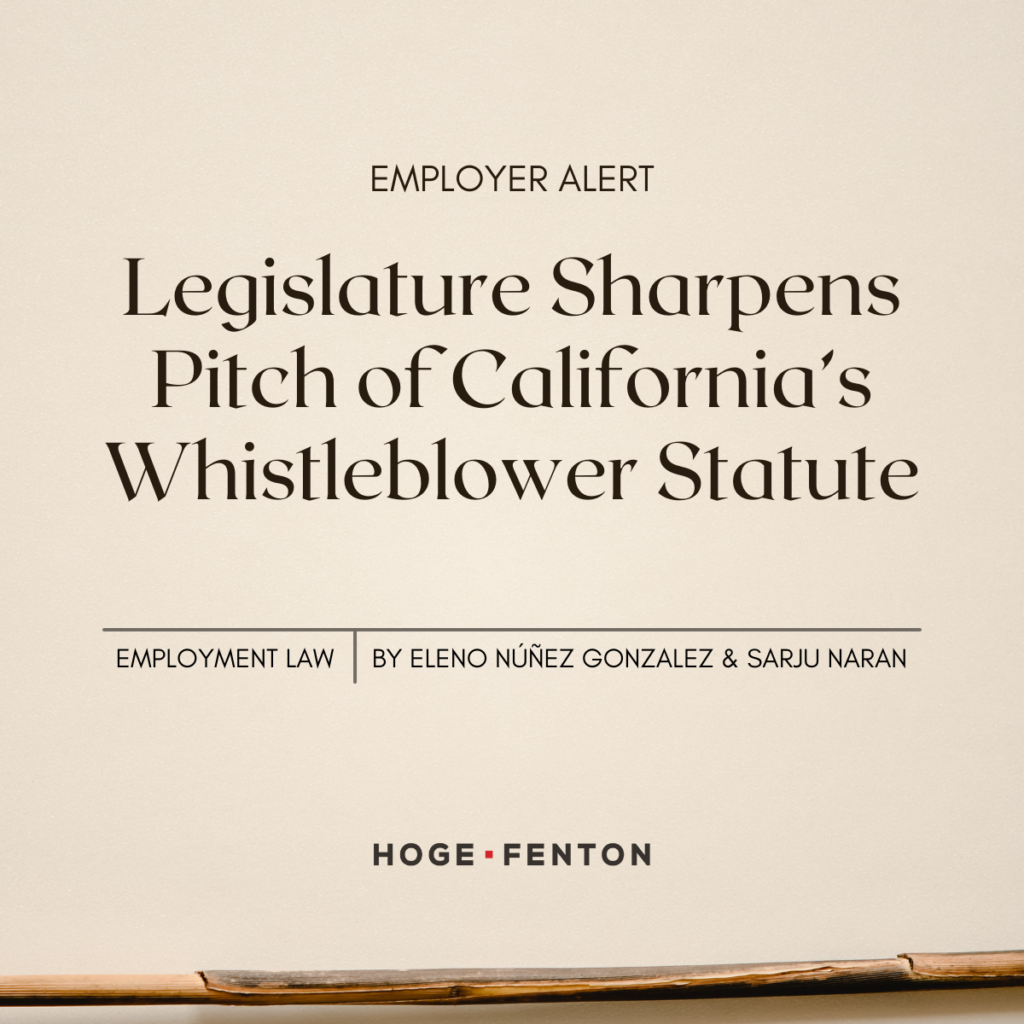Employer Alert: Legislature Sharpens Pitch of California’s Whistleblower Statute
By Eleno Núñez Gonzalez, Sarju A. Naran | 06.18.2024 | Employment Law

Legislature Sharpens Pitch of California’s Whistleblower Statute
The Equal Pay and Anti-Retaliation Protection Act (Senate Bill No. 497) went into effect on January 1, 2024, making it easier for employees to bring retaliation claims against their employers. Here is what employers need to know.
What Changed?
The key change to the law is the creation of a “rebuttable presumption” of retaliation. This means that if an employee suffers an adverse employment action (e.g., demotion, termination, bad performance review) within 90 days of reporting a legal violation, the court will presume that the employer retaliated against the employee. It then becomes the employer’s burden to overcome that presumption. This change will likely result in an increase in employee lawsuits alleging whistleblower retaliation.
What is California Law on Whistleblower Protection?
California law prevents employers from punishing employees who report legal violations such as unpaid wages, missed meal or rest breaks, or unsafe working conditions. Retaliation statutes were already favored by plaintiffs’ attorneys due to their broad applicability and low evidentiary burden.
To bring a whistleblower retaliation claim against an employer, an employee must first show their report of a legal violation contributed to an “adverse employment action.” An adverse employment action can include any negative impact on an employee’s status, including shift changes, reduced hours, or termination. If the employee demonstrates this, the employer must then provide sufficient evidence that it would have taken the same action even if the employee had not reported the legal violation. If an employer fails to do this, the employer could be on the hook for the employee’s lost wages, attorney’s fees, and a civil penalty of $10,000 (per employee or each violation).
Assume, for example, a non-exempt employee who works 10 hours per day, five days per week. If the employee is not paid the premium overtime rate for the two hours per day that exceed the eight regular hours and the employee reports this to a manager who has the authority to fix the problem, the employee is protected. Any negative consequence the employee suffers following that report, such as a reduction in hours or termination, could give rise to a claim for whistleblower retaliation.
SB 497’s Likely Effect on Existing Law
While the initial burden for an employee to bring a whistleblower claim was already low, SB 497 could significantly reduce what an employee has to show to win a claim for whistleblower retaliation.
SB 497 amends the law by creating a presumption of retaliation if an employee suffers an adverse employment action within 90 days of reporting a legal violation. This presumption means that an employee no longer needs to demonstrate that the reported violation contributed to the adverse employment action; the law presumes it was the cause.
Applying SB 497’s changes to the prior example demonstrates just how big of a change this is and the difficulty it could cause employers. If a non-exempt employee who complains of unpaid wages suffers an adverse employment action within 90 days, the court would presume the employer retaliated against the employee for blowing the whistle on a wage violation.
As one can imagine, when employers have legitimate business reasons for disciplining, terminating, or changing an employee’s employment, this presumption of retaliation will make it much more difficult for California employers to take any negative action against an employee who has made any recent complaint.
Tips for Employers to Navigate Potential Whistleblower Claims
There are several steps employers can take to reduce their legal risk.
- Take each employee’s complaint or report seriously. Use the opportunity to learn more about the nature of the complaint and/or report. Ask questions to understand the basis of the employee’s complaint and why the employee believes it is a legal violation.
- Document the employee’s complaint or report and ask the employee to provide a statement.
- Investigate the employee’s complaint or report and share the findings that either substantiate the complaint/report or not.
- Take remedial action to correct the issue if the complaint or report is substantiated. California’s whistleblower statute protects each employee who complains of or discloses their reasonable belief of illegal activity. If you are made aware of a problem, take the opportunity to remedy it.
- If after receiving a complaint or report, there are legitimate factors (e.g., performance, misconduct, attendance, company restructuring, economic layoffs) that dictate the need to discipline, terminate, or make any change to the employee’s status, make sure there is strong documentation to prove that the legitimate factors were the reason for the adverse employment action, and consider affording the employee additional coaching and opportunities to correct any performance or conduct issues before taking the adverse action.
- Remember, while the rebuttable presumption only exists for 90 days after a complaint or report is made, the risk of legal exposure can continue well beyond 90 days. So don’t terminate an employee on the 91st day and assume the employee can no longer file (and win) a retaliation claim.
- Navigating employee complaints and discipline can be complicated and risky. Consult with experienced legal counsel if you receive an employee complaint or report, and certainly before taking any adverse employment action against that employee, regardless of how much time has passed.











